BMW X6 VS Peugeot 208 – Specs, Efficiency & Price Comparison
Which model is the better choice – the BMW X6 or the Peugeot 208? We compare performance (625 HP vs 156 HP), boot capacity (580 L vs 352 L), efficiency (7.10 L vs 14.10 kWh4.50 L), and of course, the price (83600 £ vs 20200 £).
Find out now which car fits your needs better!
The BMW X6 (SUV) is powered by a Diesel MHEV or Petrol MHEV engine and comes with a Automatic transmission. In comparison, the Peugeot 208 (Hatchback) features a Petrol, Electric or Petrol MHEV engine and a Manuel or Automatic gearbox.
When it comes to boot capacity, the BMW X6 offers 580 L, while the Peugeot 208 provides 352 L – depending on what matters most to you. If you’re looking for more power, you’ll need to decide whether the 625 HP of the BMW X6 or the 156 HP of the Peugeot 208 suits your needs better.
There are also differences in efficiency: 7.10 L vs 14.10 kWh4.50 L. In terms of price, the BMW X6 starts at 83600 £, while the Peugeot 208 is available from 20200 £.
Compare all the key specs now and find out which model fits your lifestyle best!
BMW X6
The BMW X6 stands out with its distinctive coupe-like silhouette, merging the elegance of a sports car with the commanding presence of an SUV. Inside, the luxurious cabin offers premium materials and cutting-edge technology, ensuring that both driver and passengers travel in comfort and style. The vehicle's agile handling and robust performance make it a favourite among those who seek both aesthetics and driving dynamism.
details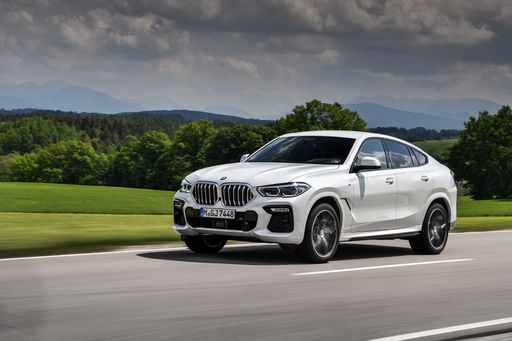 @ press.bmwgroup.com
@ press.bmwgroup.com
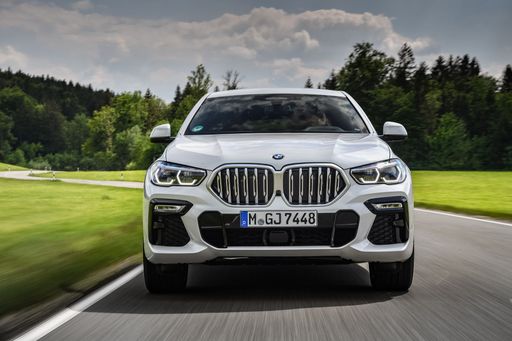 @ press.bmwgroup.com
@ press.bmwgroup.com
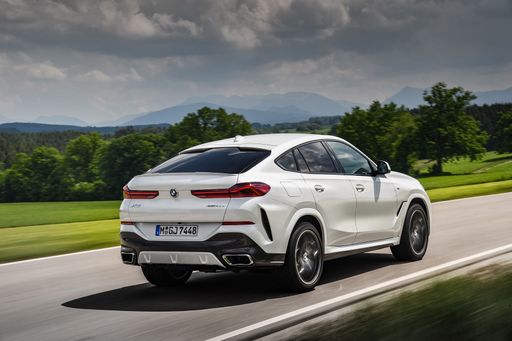 @ press.bmwgroup.com
@ press.bmwgroup.com
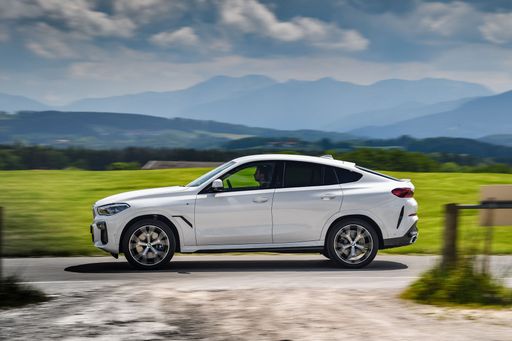 @ press.bmwgroup.com
@ press.bmwgroup.com
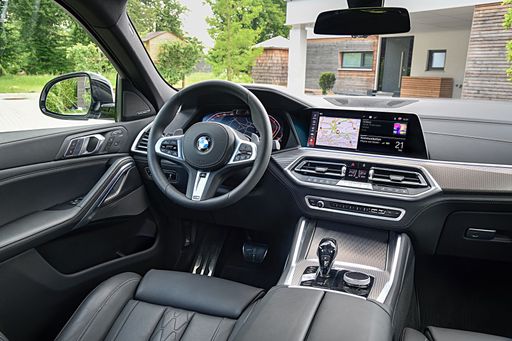 @ press.bmwgroup.com
@ press.bmwgroup.com
Peugeot 208
The Peugeot 208 exudes a distinctive French charm, combining sleek lines with an assertive stance on the road. Inside, it offers a modern and sophisticated cabin, complete with intuitive technology and high-quality finishes to enhance the driving experience. Its agile handling and efficient performance make it a delightful choice for both city commuting and longer journeys.
details @ www.media.stellantis.com
@ www.media.stellantis.com
 @ www.media.stellantis.com
@ www.media.stellantis.com
 @ www.media.stellantis.com
@ www.media.stellantis.com
 @ www.media.stellantis.com
@ www.media.stellantis.com

|

|
|
|
|
Costs and Consumption |
|
|---|---|
|
Price
83600 - 146400 £
|
Price
20200 - 35100 £
|
|
Consumption L/100km
7.1 - 12.7 L
|
Consumption L/100km
4.5 - 5.2 L
|
|
Consumption kWh/100km
-
|
Consumption kWh/100km
14.1 - 15.4 kWh
|
|
Electric Range
-
|
Electric Range
362 - 432 km
|
|
Battery Capacity
-
|
Battery Capacity
46 - 51 kWh
|
|
co2
187 - 288 g/km
|
co2
0 - 117 g/km
|
|
Fuel tank capacity
80 - 83 L
|
Fuel tank capacity
44 L
|
Dimensions and Body |
|
|---|---|
|
Body Type
SUV
|
Body Type
Hatchback
|
|
Seats
5
|
Seats
5
|
|
Doors
5
|
Doors
5
|
|
Curb weight
2240 - 2445 kg
|
Curb weight
1165 - 1530 kg
|
|
Trunk capacity
580 L
|
Trunk capacity
309 - 352 L
|
|
Length
4948 - 4960 mm
|
Length
4055 mm
|
|
Width
2004 - 2019 mm
|
Width
1745 mm
|
|
Height
1695 - 1700 mm
|
Height
1430 mm
|
|
Payload
595 - 695 kg
|
Payload
380 - 430 kg
|
Engine and Performance |
|
|---|---|
|
Engine Type
Diesel MHEV, Petrol MHEV
|
Engine Type
Petrol, Electric, Petrol MHEV
|
|
Transmission
Automatic
|
Transmission
Manuel, Automatic
|
|
Transmission Detail
Automatikgetriebe
|
Transmission Detail
Schaltgetriebe, Automat. Schaltgetriebe (Doppelkupplung)
|
|
Drive Type
All-Wheel Drive
|
Drive Type
Front-Wheel Drive
|
|
Power HP
298 - 625 HP
|
Power HP
101 - 156 HP
|
|
Acceleration 0-100km/h
3.9 - 6.1 s
|
Acceleration 0-100km/h
8.3 - 10.9 s
|
|
Max Speed
235 - 250 km/h
|
Max Speed
150 - 200 km/h
|
|
Torque
540 - 750 Nm
|
Torque
205 - 270 Nm
|
|
Number of Cylinders
6 - 8
|
Number of Cylinders
3
|
|
Power kW
219 - 460 kW
|
Power kW
74 - 115 kW
|
|
Engine capacity
2993 - 4395 cm3
|
Engine capacity
1199 cm3
|
General |
|
|---|---|
|
Model Year
2023
|
Model Year
2023 - 2025
|
|
CO2 Efficiency Class
G
|
CO2 Efficiency Class
D, A, C
|
|
Brand
BMW
|
Brand
Peugeot
|
BMW X6
Introduction to the BMW X6
The BMW X6 stands as a striking example of automotive innovation, blending power with luxury. This sports activity coupe (SAC) seamlessly fuses the dynamics of a coupe with the robust presence of an SUV. As part of BMW's acclaimed X Series, the X6 continues to captivate with its athletic traits and cutting-edge technology.
Innovative Features and Design
The BMW X6 is a visual tour de force with its unmistakable silhouette, accentuated by a sculpted bonnet and dynamic contours. This elegance is matched by its functionality, providing a spacious interior with a luxurious finish, highlighted by high-quality materials and the latest infotainment technology. The user-centric iDrive system offers intuitive control, enhancing the driving experience through an immersive digital interface.
Performance and Powertrain
Under the bonnet, the BMW X6 offers a range of powerful engines, showcasing both diesel and petrol mild-hybrid configurations. With outputs ranging from 298 to a commanding 625 PS, the X6 delivers exhilarating performance, combined with intelligent all-wheel drive for enhanced stability and traction.
Efficiency and Environmental Considerations
Despite its formidable power, the BMW X6 demonstrates a commitment to efficiency. With a fuel consumption range between 7.2 to 12.7 L/100km and CO2 emissions from 188 to 288 g/km, it offers competitive efficiency within its class. These figures reflect BMW’s dedication to reducing environmental impact without compromising on potency.
Technical Precision and Handling
The advanced adoption of features such as adaptive suspension and Dynamic Stability Control ensures the X6 handles with precision. This model exhibits responsive steering and a composed ride, navigating both urban settings and open roads with ease, making it as practical as it is powerful.
Safety and Driver Assistance
Safety is paramount in the BMW X6, equipped with a myriad of driver assistance systems. From the latest BMW Head-Up Display to the robust suite of advanced safety technologies, including collision warning and automatic emergency braking, the X6 prioritizes both security and peace of mind.
Conclusion
The BMW X6 continues to set benchmarks in the crossover segment, marrying dynamic performance with cutting-edge technology. Its blend of luxury, innovation, and power make it a standout choice for those seeking an adventurous yet refined driving experience. Whether navigating city streets or venturing into the countryside, the X6 offers a compelling mix of style, substance, and performance.
Peugeot 208
A Glimpse into the Future: The New Peugeot 208
The Peugeot 208, with its sleek design and innovative features, continues to set benchmarks in the automotive industry. As a hatchback, it seamlessly blends style with practicality, offering the perfect solution for urban driving and long-distance travels alike. In this article, we delve into the technical details and innovations that distinguish the latest iterations of the Peugeot 208.
Engine Options: Efficiency Meets Performance
The Peugeot 208 provides an array of engine options catering to different driving preferences. Featuring both petrol Mild-Hybrid technology and full electric powertrains, it offers a versatile range designed to accommodate eco-conscious drivers as well as those who prioritise performance.
With power outputs ranging from 101 PS to 156 PS, and a torque span of 205 Nm to 270 Nm, these machines are meticulously engineered to provide thrilling yet efficient drives. The petrol versions utilise a three-cylinder 1199 cm³ engine, optimising fuel consumption between 4.7 and 5.4 L/100km, while the electric e-208 models boast an impressive range of up to 410 km on a single charge.
Advanced Transmission Systems
The Peugeot 208 models come equipped with an advanced automatic transmission system, employing either a dual-clutch automatic gearbox or a manual transmission, depending on the chosen variant. These systems guarantee smooth gear transitions, thus enhancing driving pleasure and overall efficiency.
Performance and Environmental Considerations
From a performance standpoint, the Peugeot 208 impresses with its ability to accelerate from 0 to 100 km/h in between 8.3 to 10.9 seconds, depending on the model chosen. This level of performance is complemented by a top speed ranging from 150 to 200 km/h, ensuring that the 208 is more than capable of holding its own on the motorway.
With environmental consciousness at the forefront, the vehicle's CO2 efficiency class ranges from A to D, further establishing the Peugeot 208 as a responsible option for modern drivers keen on reducing their carbon footprint.
Comfort and Practicality: A Class Act
The interior of the Peugeot 208 reflects its exterior's stylish flair. It comfortably seats five passengers and offers a boot capacity of 265 to 309 litres, accommodating both city commutes and weekend getaways. Advanced comfort features and a state-of-the-art infotainment system ensure that rides are as enjoyable for passengers as they are for the driver.
Cost Considerations
The Peugeot 208 manages to strike a remarkable balance between cost efficiency and luxury. With prices ranging from €22,950 to €40,825, there is a variant to suit most budgets while still providing a premium experience. Additionally, the monthly costs and costs per kilometre are kept in check, making it an economically sound choice in the long term.
Dimensions and Design: Compact yet Spacious
Measuring 4,055 mm in length, 1,745 mm in width, and 1,430 mm in height, the Peugeot 208 maintains a compact profile that is perfectly suited to tight urban environments. Despite its manageable size, it offers ample space inside, thanks in part to clever design and engineering.
Conclusion: A Future-Proof Choice
The Peugeot 208 is a testament to modern automotive innovation. Whether powered by traditional engines or fully electric powertrains, it consistently delivers on performance, efficiency, and style. The combination of cutting-edge technology and sustainable practices places the Peugeot 208 as a forward-thinking choice for drivers seeking a vehicle that epitomises the best of contemporary motoring.
The prices and data displayed are estimates based on German list prices and may vary by country. This information is not legally binding.
